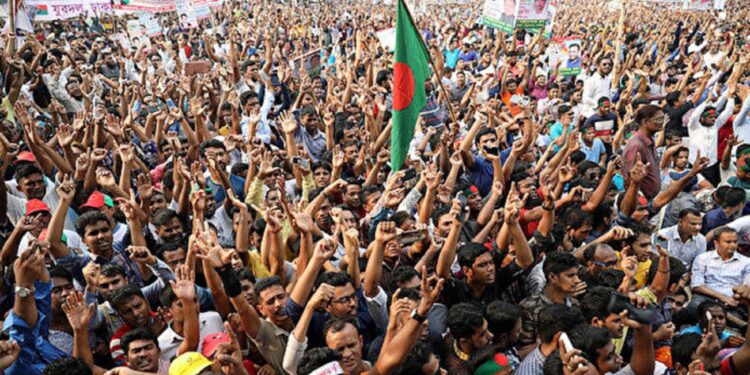American bipartisan team’s five-point recommendations for holding free, fair, participatory and inclusive elections will be difficult for the two main political parties to work with; no breakthrough likely

A file photo of election campaigning in Bangladesh. (Photo: yenisafak.com)
The recommendations offered by the American joint team, drawn from the International Republican Institute (IRI) and the National Democratic Institute (NDI), are:
• Moderate rhetoric and engage in open and substantive dialogue on key election issues.
• Protect freedom of expression and ensure an open civic space where dissent is respected.
• Commit to nonviolence and hold perpetrators of political violence accountable.
• Create conditions to allow all parties to engage in meaningful political competition, including bolstering independent election management.
• Promote a culture of inclusive and active electoral participation among citizens.
ALSO READ US team likely to reach Dhaka on Oct 8 to examine Bangladesh electoral ground realities
The “election issues”, which the IRI-NDI team did not explicitly identify but have broadly hinted at – and this includes the very contentious matter of the political and constitutional circumstances under which an election should be held – are seen and viewed differently by the Awami League and the BNP. The Awami League continues to remain firm on holding the polls within the framework of fraught constitutional provisions. On the other hand, the BNP is not prepared to budge from its stated position that the elections should be held under the stewardship of an interim/caretaker regime.
The Awami League’s position is defensive in nature. The last 15 years of unbroken rule by Sheikh Hasina is largely characterised in Bangladesh as one of malgovernance, corruption, nepotism, widespread abuse of human rights, enforced disappearances of political opponents, high-handedness by the police and other law enforcement authorities and a deliberate actions to shrink the opposition’s political space. Sheikh Hasina has much answer for, even though there is some consensus that she ushered in rapid economic development with the aid and assistance of China.
On its part, the BNP, which cannot boast of a strong and tall leader capable enough to lead the party on the ground, is on the offensive. The BNP believes that anti-incumbency factors are favourable for it to make a decisive comeback following its “missteps” in the 2014 and 2018 elections. The BNP leadership also senses that international sentiments, largely expressed by the western bloc led by the US, especially in the form of visa restrictions against several categories of Bangladeshis, are in its favour. This alone, BNP leaders say, can act as sustained pressure on the ruling Awami League and force it to mend its ways.
ALSO READ No Hindu leader on BNP team: When an invisible minority is overlooked
As the prevailing situation across the country turns fraught, all eyes are on the BNP’s planned countrywide political rallies that will begin after the Durga Puja festivities end. Will the ruling Awami League, caring little for US punitive action, including likely sanctions, take repressive measures, with the support of a pliant and favourable police force and civil administration, to break up the BNP electoral rallies? Or will it be more restrained in its approach towards the BNP? The Awami League may not relent and may actually follow a hardline approach with a violent crackdown on its political rivals. This could bring matters to a head and push the government to take some drastic action.
The meeting between US ambassador to Dhaka, Peter Haas, and BNP secretary-general Mirza Fakhrul Islam Alamgir, though denied by the latter, did discuss some substantive political issues which party leaders are chary to discuss or disclose. However, sources said that the Haas-Alamgir confabulation at Dhaka’s American Club, discussed some key elements of the future political roadmap, including the duration of an interim government.
“What Bangladesh needs today is an interim government that should have the mandate to continue for a minimum of two and a maximum of three years so that the country’s broken institutions can be salvaged,” said veteran freedom fighter and seasoned advocate Fazlul Rahman.
ALSO READ Was Sept 27 Hasina-Sullivan meeting put together by an Indian official?
What the IRI-NDI delegation did not quite factor in – at least its preliminary statement released to the media today does not reflect so – is the worsening economic situation that has fueled and will continue to stoke anti-incumbency and act as grist to the BNP’s political-electoral movement preceding the elections. The ruling Awami League has so far shown no alacrity in stemming the economic downturn. Indeed, it has no eleventh hour prescription to arrest the situation.
Speaking to Northeast News, JANIPOP chairman and political commentator Professor Nazmul Ahsan Kalimullah said, “There is a gap between on-the-ground reality and the idealistic recommendations of the IRI-NDI delegation. Neither of the two main political parties will be able to fulfill the recommendations. So, what next? Since the IRI-NDI expectations cannot be met by the political parties, the crisis will not be resolved as there is now no room for any dialogue between the two sides. This means that there might not be any way out of the deadlock and there might not be any breakthrough”.
Meanwhile, political analysts in Dhaka find the departure of Bangladesh president Mohammad Shahabuddin to Singapore tomorrow to be “extremely significant from a political perspective”. The official notification of the visit was put today, less than 24 hours after Sheikh Hasina met Shahabuddin at Bangabhavan on September 14. Shahabuddin will be away in Singapore for two weeks. On October 24, the prime minister is expected to travel to Brussels. While the official reason for Shahabuddin’s Singapore visit – twice in two months – is said to be health-related treatment, Awami League sources said that “Bangladesh might witness a different kind of political drama in the days to come”.

